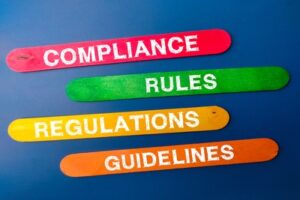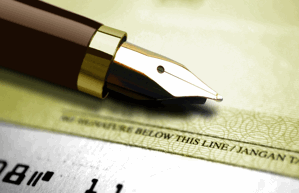 Why do you need to provide ID and verify your online betting account yet you can just walk into a high street bookie or casino and place a bet unchallenged?
Why do you need to provide ID and verify your online betting account yet you can just walk into a high street bookie or casino and place a bet unchallenged?
Well, despite popular belief, this has nothing to do with the government getting its tax or the industry keeping track of you, it is all to do with protecting minors and other vulnerable people from gambling, and preventing fraud and money laundering.
Confirming the age, location and residential status of a customer is a legal requirement of possessing a UK gambling licence, and betting sites are obliged to collect this information. So, if you have ever got angry with a bookie for requiring this information, your anger is misdirected.
In many instances, this information can be verified without you even knowing about it through processes called ‘soft credit checks’, but you may have to provide evidence yourself. Whether automatic or manual, these checks are largely in place to prevent bookmakers being used for the proceeds of crime.
In this article we will discuss the law behind verification and the reasons why it exists. We will tell you what types of ID are suitable, how long you should expect to wait, and what to do if your verification has been refused and you think this is unfair.
- ID & Verification:
- Why do I need to?
- What is the law?
- Providing ID
- Credit Checks
- Refused
New Age Verification Rules For Online Gambling 2019
In early 2019, the UK Gambling commission announced rule changes to age verification procedure for UK licensed operators. Up to that point, gambling businesses were required to verify age within 3 days and could not allow customers to withdraw until they did so. Now however, brands must verify the age of a user before a first deposit or bet can be made, even if that is with a free bet or bonus.
The principle aim here is to prevent children from gambling. Prior to this, someone under the age of 18 could, in theory, deposit and gamble online even though they wouldn’t be able to withdraw if they won. Now, all customers who fund an account or bet will be pre-vetted.
The rules also extend to free to play games, such as slot demos, with all sites that offer these now required to verify age first. While using demo slots is not gambling, the UK Gambling Commission argue that there is no legitimate reason for children to play them, and they could be a pathway to real gambling.
At worst, the effect on the customer is a slightly longer delay between signing up to a site and being able to deposit and bet. Many age verification checks are incredibly fast, and serious operators will be able to turn this around in minutes.
Why Do I Need to Provide ID and Verify my Betting Account?
Age Verification
 Age verification is the primary reason behind the need to verify an online betting account. When you walk into a betting shop or a casino the cashier will visually check your appearance and will make a decision on whether you are under age or not. If they think you might be, they will ask for ID to confirm this.
Age verification is the primary reason behind the need to verify an online betting account. When you walk into a betting shop or a casino the cashier will visually check your appearance and will make a decision on whether you are under age or not. If they think you might be, they will ask for ID to confirm this.
The exact same process is required for an online bookie or casino, except they obviously cannot make a visual assessment, so they must ask everyone for ID whether you look 18 or 81.
You must be 18 to gamble in the UK and this must be verified by licensed operators in order for you to deposit, bet and and ultimately withdraw any funds. It’s just the law.
If you are on the electoral roll at the address you provide to the bookie then this can often be checked automatically, if not you will need to provide proof of age such as:
- passport
- driving license
This is done electronically, so it’s really fast, and all of your information is secure thanks to the highest levels of encryption.
Fraud and Money Laundering
 Certain unscrupulous characters may decide to get rid of their ill-gotten gains by wagering it online at super short odds, and then withdrawing any cash as ‘clean money’.
Certain unscrupulous characters may decide to get rid of their ill-gotten gains by wagering it online at super short odds, and then withdrawing any cash as ‘clean money’.
On average, most bets and games pay out well over 90% of takings in winnings, so for money launderers, giving a few percent away to the bookie in exchange for clean cash is a good deal.
The bookmaker or casino may therefore ask people betting larger amounts to confirm their identification beyond the usual background checks. This doesn’t mean they suspect you of money laundering or fraud. You may have been selected at random, have a similar name to someone connected to criminal activity, or the operator has not been able to obtain sufficient information from your background check, so don’t take it personally.
In terms of fraud, if the bookie suspects there is even a remote chance that the banking method you are using may not belong to you then they will ask for further ID. This will commonly occur if your card or payment account is not registered at the same address as the one you provided to the betting site.
You may find that you have been playing with a betting site for some time before they ask you for further verification. This will likely be because you’ve made a large deposit or withdrawal that is either out of character or hits a threshold set by the bookmakers’ system.
Checking your ID is very different to judging you to have done something wrong, but betting companies can suspend accounts and refuse to pay out if they suspect criminal activity. However, this doesn’t mean you have no right to appeal. You should be given every opportunity to prove your identity, and any disputed funds will be held pending the resolution of a complaint. There are third party sources that can help to mediate these complaints, and defined laws regarding how such cases should be judged.
What is the Law Behind Verification?
 Many years ago, an online betting site could basically do what they liked. Many were unregulated, but as the industry grew this was progressively abused.
Many years ago, an online betting site could basically do what they liked. Many were unregulated, but as the industry grew this was progressively abused.
The Gambling Act of 2005 made it illegal to operate an unlicensed online bookmaker in the UK for the first time. This was the first major piece of gambling legislation since the Gambling Act of 1960 that made off course betting legal.
The 2005 act states that operators in the UK must prevent crime and fraud, promote an open and honest industry, and ultimately protect vulnerable people. Part of this requires bookies to check age and verify ID and funding sources.
The 2005 act also brought into being the UK Gambling Commission, an executive, non-departmental body of the government’s department of culture. The body have the power to award and revoke licences, as well as take legal action and issue financial penalties against operators that misbehave.
In 2014, the act was amended to make the law more stringent.
It became illegal to operate in the UK without a licence even if you were based abroad. This is why you have to verify your betting account irrespective of where your bookie is based. The law also enforced stronger rules on the promotion of responsible gambling and protection of vulnerable people.
Read more about this in our guide to UK gambling licensing and law.
What Type of ID do I need and How do I Provide it?
 The precise ID methods vary between operators, some ask for much more than others.
The precise ID methods vary between operators, some ask for much more than others.
At the most basic level you will be asked for:
- name
- a UK registered address
- payment method
If your chosen payment method is a UK bank account registered at the same address, then it is highly likely that this will be all you need to provide.
The betting site will then cross check your address against the electoral roll, and if you are registered at this address then your account should be verified.
When you sign up, you will also need to tick a box confirming you’ve read the T&C’s that state you are over 18 years of age, you are who you say you are, and that you are not using laundered or fraudulent funds.
If you are not on the electoral roll, are not a UK citizen, or you have registered at a different address to the one used for your payment method, then you may be asked for further ID. This could also happen if you hit a payment or withdrawal threshold after a period of betting.
Generally you will need to provide:
- Photo ID – Driving licence, passport (photo and cover page) or a national ID card
- Payment ID – This may be a scanned picture of the front and back of the bank card or a recent statement
- Proof of Address – Bank or utilities statement, council tax, phone bill, etc., usually dated within the last three months
Most operators will accept these as colour scans by email or even via a live chat upload, as long as they can read the relevant numbers to check the ID. If you ask, you may be able to post your information, but this will obviously take a lot longer.
A word of advice, if you do send in a scan of your bank card cover up the CCV code on the back of the card. They don’t need this to verify the account, and without it, even if someone intercepts your email they can’t fraudulently use your card.
It is more likely you will be asked for further ID if you sign up using some eWallet services like Skrill, PayPal or Neteller or if you use a foreign bank card/account. If you have a UK bank account at your registered address I recommend you use this to sign up and make your initial deposit, and then switch to another payment methods later down the line. It also generally means you remain eligible for introductory offers.
Can an Online Bookmaker Perform Credit Checks on Me?
 Operators, both bookmakers and casinos, can legally perform what is called a ‘soft credit check’.
Operators, both bookmakers and casinos, can legally perform what is called a ‘soft credit check’.
This will be stated in the terms and conditions when you register.
The credit check can only be used for ID purposes though, not to check your credit score.
You may have heard that having too many credit checks can damage your credit score, and this is true, however, the ‘soft checks’ I am talking about do not fall into this category.
You can have unlimited soft checks without damaging your credit score, so don’t worry about this side of things.
If you are still concerned about this, you can sign up using a different payment method and send in ID.
What is Know Your Customer (KYC)?
Many sites refer to the verification process under the umbrella term ‘Know Your Customer’, or KYC.
This is simply a phrase used for the verification process and covers the initial age and address verification checks, so it basically refers to a lot of what I have talked about in this article.
Note that you may pass the KYC check but still need to provide further ID when making a withdrawal.
Your Verification has Been Refused: Why? What can you Do?
 If you provide legal identification that proves you are resident in the UK, old enough to bet, and are using your own legitimately earned funds, there is no regulatory reason why a betting site should refuse you an account.
If you provide legal identification that proves you are resident in the UK, old enough to bet, and are using your own legitimately earned funds, there is no regulatory reason why a betting site should refuse you an account.
That said, bookmakers, casinos and betting sites are private businesses, and if they decide that they don’t want to give you an account there is little you can do. Luckily, there are plenty more fish in the sea so you could always try another online betting site.
If you already have an account, have won money, and now you are being refused a withdrawal without further verification, then this is likely due to you hitting a certain threshold. If you provide the relevant ID the bookie should release the funds.
If they still won’t release the funds after ID has been provided, you can approach both the UK Gambling Commission and IBAS.
For more information about this see our article on how to make a complaint.
My Bookmaker or Casino Hasn’t Asked for Verification
 This may be for three reasons:
This may be for three reasons:
- The bookmaker/casino may have verified who you are simply from the details you provided at registration, in which case there is nothing to worry about.
- You have been age verified but are yet to hit the withdrawal threshold for further verification. Some betting sites will let you withdraw up to around £2,000 before you are required to go through further money laundering and fraud checks.
- You are unwittingly betting with an unlicensed bookie. Whilst it is illegal to operate in the UK without a licence, many unlicensed companies still accept UK players. This may seem like an attractive option to avoid verification, but if you do bet with operators like this you will have no legal protection if things go south. The company could close your account and you might never see your funds again. In short, it’s not safe. Every UK licenced bookie will display their licence information at the bottom of their pages, so if you don’t see this then don’t sign up. Every bookie we list on this site is fully UK licenced and you can find details of all of their licence numbers here.